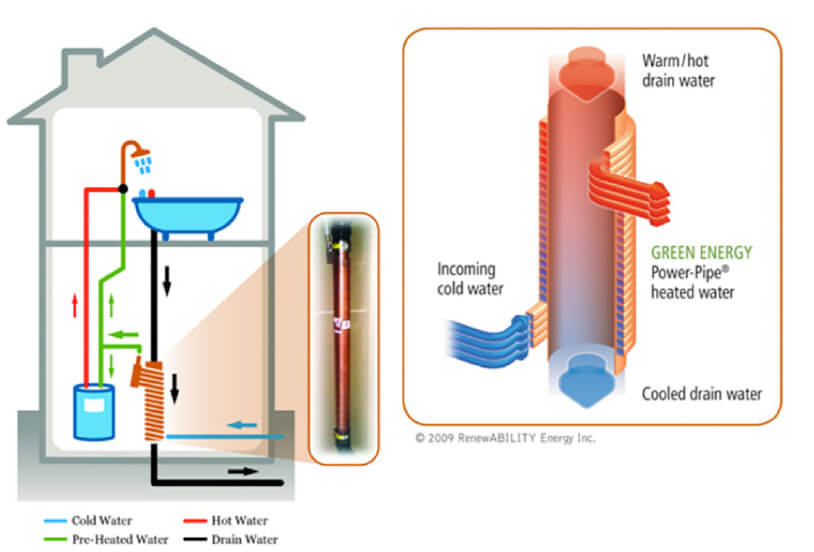
 11
11




 11
11




I'd like to stress this even more. Back in the 80's in Ontario they first came up with the concept of "R2000" homes. Lot's of people said it's too expensive, people can't afford it, etc etc. However, as time went on, sure enough, not only had people saved a bunch of money on heating/cooling costs, but their R2000 homes sold faster and for more money than conventional homes of the same size.Of course, you would want to find ways to avoid the heat in the first place, like placing shades over windows, planting trees, and even solar panels on the roof can partially shade the actual roof and cool it somewhat. I kinda like the idea of an outdoor window shade above the window that consists of a solar panel--a sort of 2-for-1 deal.
Visit Redhawk's soil series: https://permies.com/wiki/redhawk-soil
How permies.com works: https://permies.com/wiki/34193/permies-works-links-threads
 8
8




Some places need to be wild
 9
9




Some places need to be wild
 7
7




If nothing else, where I live, the cost of insuring a "new car" compared to our almost 20 year old car will be huge.Eric Hanson wrote:My parents just found this out when trying to buy a Toyota Prius. It is very expensive right now and probably costs more than the gas saved.
Visit Redhawk's soil series: https://permies.com/wiki/redhawk-soil
How permies.com works: https://permies.com/wiki/34193/permies-works-links-threads
 5
5




Some places need to be wild
 5
5




Iterations are fine, we don't have to be perfect
My 2nd Location:Florida HardinessZone:10 AHS:10 GDD:8500 Rainfall:2in/mth winter, 8in/mth summer, Soil:Sand pH8 Flat

 5
5




S Bengi wrote:Inflation just hit very hard.
Electricity cost will go up by 64%. https://www.boston.com/news/local-news/2022/09/22/national-grid-higher-electric-bills-natural-gas
Electricity via prepaid Solar Panel (or even by a loan) is looking very good right about now.
Live, love life holistically


 4
4




Iterations are fine, we don't have to be perfect
My 2nd Location:Florida HardinessZone:10 AHS:10 GDD:8500 Rainfall:2in/mth winter, 8in/mth summer, Soil:Sand pH8 Flat
 9
9




Eat healthy, mostly home-grown vegetables and a little protein. Get plenty of exercise. Get fresh air and sunshine. Manage little problems before they become big problems. Sounds like a well designed homestead can help a lot!S Bengi wrote: So what could I do with my homestead now to reduce my future healthcare cost in the future?
Visit Redhawk's soil series: https://permies.com/wiki/redhawk-soil
How permies.com works: https://permies.com/wiki/34193/permies-works-links-threads
 9
9




Jay Angler wrote:
Eat healthy, mostly home-grown vegetables and a little protein. Get plenty of exercise. Get fresh air and sunshine. Manage little problems before they become big problems. Sounds like a well designed homestead can help a lot!S Bengi wrote: So what could I do with my homestead now to reduce my future healthcare cost in the future?
"The only thing...more expensive than education is ignorance."~Ben Franklin
"We can easily forgive a child who is afraid of the dark; the real tragedy of life is when men are afraid of the light." ~ Plato
 11
11




Natural Small Batch Cheesemaking A Year in an Off-Grid Kitchen Backyard Dairy Goats My website @NourishingPermaculture






 7
7




"The only thing...more expensive than education is ignorance."~Ben Franklin
"We can easily forgive a child who is afraid of the dark; the real tragedy of life is when men are afraid of the light." ~ Plato
 4
4




 5
5




 8
8




 8
8




Lina
https://catsandcardamom.com
 7
7




Peasants slept on beds of straw, while Emperors slept on beds of hulls.
www.OpenYourEyesBedding.com
 8
8




 3
3




Ellendra Nauriel wrote:Start by designing the house. Go heavy on the insulation and waterproofing. Maybe even look into heat exchangers for the ventilation system. Position outlets so they don't create a hole in the insulation. Run the plumbing in such a way that hot water going down the drain gives back at least part of its heat before it really leaves the house (not sure I'm phrasing that the right way). Add lots of thermal mass to help keep things warm in the winter and cool in the summer. Have multiple storage areas for foods, keeping in mind that some need slightly different storage conditions. Make sure you have a few difference ways to cook, in case one type of fuel becomes hard to get. If you can develop a fuel source on your own property, even better. The standard is wood, but something like corn cobs would also work. More fuel options than I can summarize, really.
Try to position things with an eye toward efficiency and safety. An example would be adding a trellis or grow-tunnel between the house and the barn, so that it shelters the walkway in bad weather. Or positioning the fridge so that it takes fewer steps to bring in groceries.
When deciding what foods to produce for yourself, there are lots of factors to consider, and price is only one of them. Eggs are a good example. In my area, eggs are cheap, when they're available. But they're also one of the first things to sell out if anything happens, and they're a huge part of my family's diet, so I feel better having my own chickens. Many times in the last two years, those chickens kept us supplied when eggs were nowhere to be found in the stores. If you choose the right breed, chickens can raise their own replacements, with any extras being used for meat. Choose a breed that fits your climate, temperament, and farming style.
The same factors apply to plants. Herbs, spices, and greens are probably a good start, since they can be both expensive and easy to grow. But by weight, the bulk of your food is probably going to be carbohydrates, which means things like potatoes, squash, carrots, etc. Those can be cheap, when they're available, but growing your own still helps. Dry beans and grains can take a lot of room for the amount harvested, but they're easy to store.
I wish I had a formula on what order to prioritize everything in. But there are too many factors to consider, and everyone is a little different. The only thing that's certain is that the more you're able to provide for yourself, the less things like inflation will hurt you.
* Follow your curiosity , Do what you Love *
my site and blog, about nature connection, spiritual mentoring & energy healing: Simperi
my Etsy shop, with unique antique and vintage finds: TreasureChestTales
 3
3




Nina Surya wrote:
This thread is from some time ago already but still very important!
Ellendra, I'm trying to come up with some kind of practical solution to what you said "Run the plumbing in such a way that hot water going down the drain gives back at least part of its heat before it really leaves the house ". I think you're phrasing it right but can you give an example of what, how...?
We're currently renovating an old (OLD!) farmhouse in France and plumbing will be an action point very soon, so... open to all new ideas!
Lina
https://catsandcardamom.com
 4
4




Nina Surya wrote:
Ellendra Nauriel wrote:Run the plumbing in such a way that hot water going down the drain gives back at least part of its heat before it really leaves the house (not sure I'm phrasing that the right way).
Ellendra, I'm trying to come up with some kind of practical solution to what you said "Run the plumbing in such a way that hot water going down the drain gives back at least part of its heat before it really leaves the house ". I think you're phrasing it right but can you give an example of what, how...?

 5
5




 6
6




Invasive plants are Earth's way of insisting we notice her medicines. Stephen Herrod Buhner
Everyone learns what works by learning what doesn't work. Stephen Herrod Buhner












 12
12




Live, love life holistically
 8
8




Anne Miller wrote:I love these older threads as they are a wealth of information.
The way I battle inflation is to have a large area for food storage.
The money I spend I consider to be an investment.
Rotation is the most important chore when doing food storage.
Buying or growing only food that your family will eat.
Meal planning is also inportant.
And including a freezer in the equation is important.
 14
14
















 6
6




Kelly Craig wrote:On the matter of investments, we made the leap and bought a freeze dryer a couple years ago.
The way I look at it is, some people, including those who complain about the initial cost of the dryer, spend money on four wheelers, boats, fancier cars and trucks, and fancier houses that cost far more than the freeze dryer, even after buying Mylar bags, a freezer to pre-freeze, extra trays, a vacuum sealer, storage racks, storage tubs, and so on.
Unlike the aforementioned more frivolous expenditures, and fishing aside, the freeze dryer continues to pay for itself. And, if power was knocked out one time, causing the loss of the contents of one of the freezers would make the dryer an even quicker pay off, for the hundreds of dollars in food that does not have to be frozen, but which, when re-hydrated, is indistinguishable from fresh.
Live, love life holistically












 8
8




Scotttt Davis wrote:We live in the burbs, we took a master gardeners class on basic food storage techniques/preservation. The instructor also lives in the burbs. He walks around his neighborhood and sees ( as do we ) homes with fruit trees that go untouched. He approaches the homeowner/renter and volunteers to keep the tree mess cleaned up in exchange for the fruit, he cans/dehydrates and he also trades harvested fruit for meat and eggs from friends in the countryside. We share our extra fruit with family, friends and donate some ( some trees produce so much you can’t even give it away ) to the local food bank. We are learning to can and dehydrate fruits, herbs and veggies. Wish we could afford one of those freeze drying contraptions.
This year, 2024, we saw organic zucchini going for $3.49 lb and we were giving it away. 4 plants produce a lot of fruit.
Live, love life holistically
 10
10




Kelly Craig wrote:Unlike the aforementioned more frivolous expenditures, and fishing aside, the freeze dryer continues to pay for itself. And, if power was knocked out one time, causing the loss of the contents of one of the freezers would make the dryer an even quicker pay off, for the hundreds of dollars in food that does not have to be frozen, but which, when re-hydrated, is indistinguishable from fresh.
Working toward a permaculture-strong retirement near sunny Sperling.
 4
4




 10
10




 12
12





|
His brain is the size of a cherry pit! About the size of this ad:
turnkey permaculture paradise for zero monies
https://permies.com/t/267198/turnkey-permaculture-paradise-monies
|

